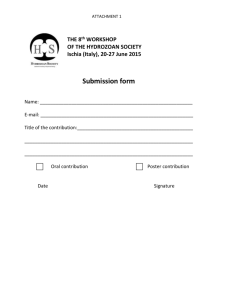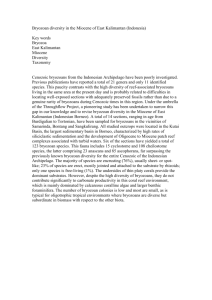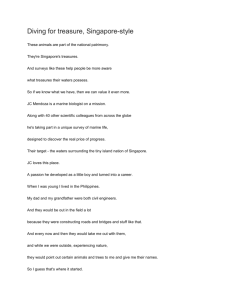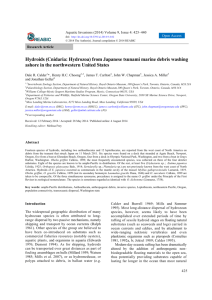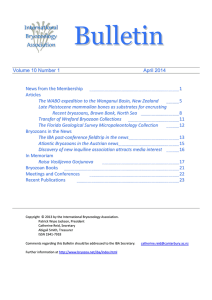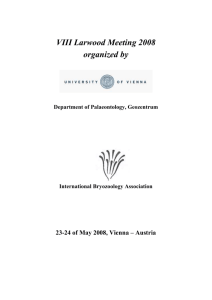Biodiversity & Taxonomy Workshop Series 4
advertisement
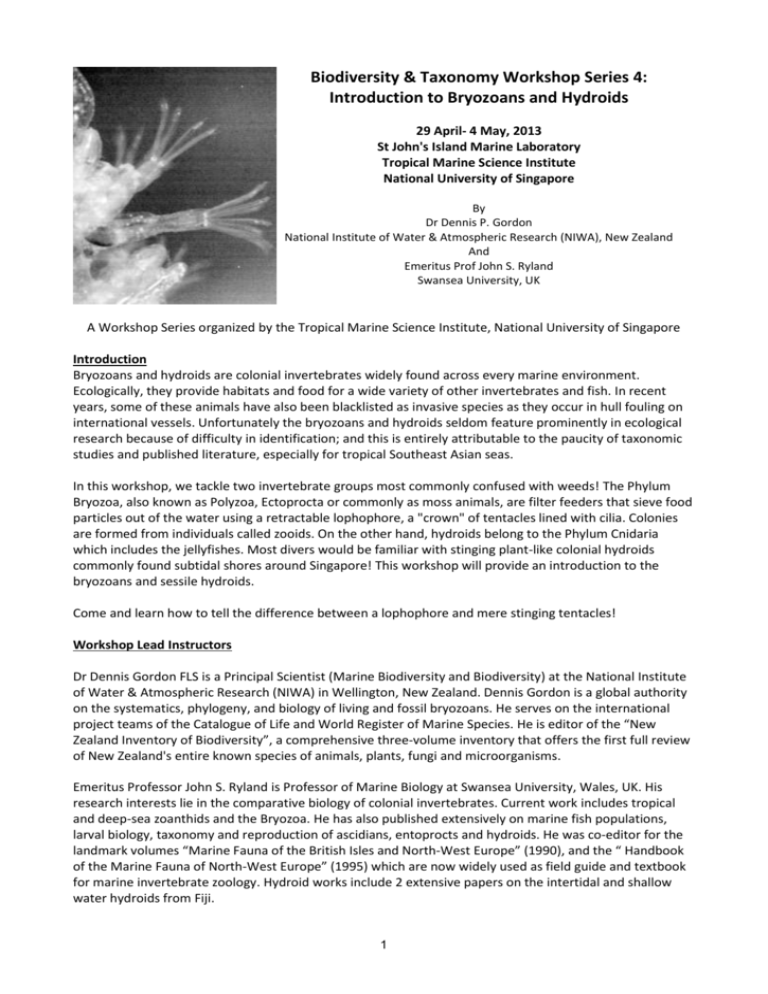
Biodiversity & Taxonomy Workshop Series 4: Introduction to Bryozoans and Hydroids 29 April- 4 May, 2013 St John's Island Marine Laboratory Tropical Marine Science Institute National University of Singapore By Dr Dennis P. Gordon National Institute of Water & Atmospheric Research (NIWA), New Zealand And Emeritus Prof John S. Ryland Swansea University, UK A Workshop Series organized by the Tropical Marine Science Institute, National University of Singapore Introduction Bryozoans and hydroids are colonial invertebrates widely found across every marine environment. Ecologically, they provide habitats and food for a wide variety of other invertebrates and fish. In recent years, some of these animals have also been blacklisted as invasive species as they occur in hull fouling on international vessels. Unfortunately the bryozoans and hydroids seldom feature prominently in ecological research because of difficulty in identification; and this is entirely attributable to the paucity of taxonomic studies and published literature, especially for tropical Southeast Asian seas. In this workshop, we tackle two invertebrate groups most commonly confused with weeds! The Phylum Bryozoa, also known as Polyzoa, Ectoprocta or commonly as moss animals, are filter feeders that sieve food particles out of the water using a retractable lophophore, a "crown" of tentacles lined with cilia. Colonies are formed from individuals called zooids. On the other hand, hydroids belong to the Phylum Cnidaria which includes the jellyfishes. Most divers would be familiar with stinging plant-like colonial hydroids commonly found subtidal shores around Singapore! This workshop will provide an introduction to the bryozoans and sessile hydroids. Come and learn how to tell the difference between a lophophore and mere stinging tentacles! Workshop Lead Instructors Dr Dennis Gordon FLS is a Principal Scientist (Marine Biodiversity and Biodiversity) at the National Institute of Water & Atmospheric Research (NIWA) in Wellington, New Zealand. Dennis Gordon is a global authority on the systematics, phylogeny, and biology of living and fossil bryozoans. He serves on the international project teams of the Catalogue of Life and World Register of Marine Species. He is editor of the “New Zealand Inventory of Biodiversity”, a comprehensive three-volume inventory that offers the first full review of New Zealand's entire known species of animals, plants, fungi and microorganisms. Emeritus Professor John S. Ryland is Professor of Marine Biology at Swansea University, Wales, UK. His research interests lie in the comparative biology of colonial invertebrates. Current work includes tropical and deep-sea zoanthids and the Bryozoa. He has also published extensively on marine fish populations, larval biology, taxonomy and reproduction of ascidians, entoprocts and hydroids. He was co-editor for the landmark volumes “Marine Fauna of the British Isles and North-West Europe” (1990), and the “ Handbook of the Marine Fauna of North-West Europe” (1995) which are now widely used as field guide and textbook for marine invertebrate zoology. Hydroid works include 2 extensive papers on the intertidal and shallow water hydroids from Fiji. 1 Objectives The goal of the biodiversity workshop series is to impart to participants the necessary skills and knowledge to begin to address the systematics and biology of tropical marine organisms. In this fourth workshop, we will focus on bryozoans (Phylum Bryozoa) and hydroids (Phylum Cnidaria, Class Hydrozoa, Order Hydroida). The workshop focuses on hands-on laboratory sessions where participants learn to prepare collected specimens for identification, including anatomical examination. Field trips will be conducted to complement the laboratory work. The workshop program consists of: 1. Skills training, to enable participants to begin to identify the animals on their own. Course content will include notes to major genera, introduction to taxonomy of major groups of bryozoans and hydroids, as well as hands-on dissection, providing participants with practical skills in recognizing and using characters for identification. 2. Lecture and practical sessions on ecology, with emphasis on biofouling and invasive species. 3. Basic skills training in how to describe a species. Programme The full workshop program consists of a five-day residential course covering lectures, laboratory work and field trips. A minimum of 12 confirmed full time participants will be required for this course to proceed, and the organizers reserve the right to cancel the course if there is insufficient demand. Due to logistic constraints, a maximum of 20 places are offered for full-time residential participants. Priority will be given to postgraduate students and researchers requiring taxonomic training for biodiversity studies. Full-time participants are expected to attend the entire program, including all laboratory sessions. Full-time participants may also bring preserved animals from their research to work with during the hands-on sessions. Please contact the organizers if you plan to bring your own specimens to Singapore for the workshop. For participants who only wish to gain an overview without the technical training, we recommend nonresidential part-time attendance. Part-time participants may only attend the lectures, and observe some of the lab sessions where space permits. Ample time will be given for Q&A after each lecture. Part-time participants may not attend field trips or take part in lab sessions. Registration, fees and payment For full participants, the deadline for registration is 1 March 2013. If you are interested to attend the workshop as a full time residential participant, please write in to the Secretariat as soon as possible. We will send you an email by 11 March 2013 to confirm your application, and payment of registration fees should then be made by 1 April 2013 to confirm your attendance. The organizers reserve the right to offer seats to another participant if no payment or formal confirmation has been received by the 1 April 2013. Payment method, logistics and what to bring will be sent to participants after attendance is confirmed. Registration fees for full participants cover lecture and bench fees, accommodation, meals, utilities, field trips and boat travel to/from St John’s Island. For part-time participants, please contact the Secretariat to register. Payment for confirmation of participation must be made by 19 April 2013 to enable boat travel arrangements to be confirmed. Registration fees for day participants cover lecture and boat travel to/from St John’s island. Travel Overseas participants are expected to cover their own expenses for travel to Singapore and accommodation in Singapore prior to and after the workshop. You are strongly advised to purchase travel and health insurance as appropriate. Accommodation, Meals 2 Full participants will be provided air-conditioned dormitory-style rooms for the period of the workshop (29th April night through 4th May 2013) at TMSI marine station on St John’s Island. Breakfast, lunch and dinner will be catered for all participants during the workshop. If you have any dietary restrictions or health issues, please inform the Secretariat. Insurance All participants are expected to obtain their own travel and personal accident insurance. The organizers are not liable for any mishaps during the workshop. Indemnity forms will be issued on confirmation of your registration. Registration Fees: (SGD$ nett) Full (Residential) Participants (non-NUS; ASEAN): Full (Residential) Participants (International): Part-time participants (non-NUS, non-residential): S$550 nett S$900 nett S$25 per half day session Payment Methods: Cash and personal cheque payment are only available to local participants. For international participants, payment by bank draft is preferred. Please contact the secretariat if you (your organization) require an invoice and/or wish to pay by inter-bank telegraphic transfer. -------------------------------------------------------------------------------------------------------------------Main Organizer: Dr Serena TEO tmsteolm@nus.edu.sg Workshop Secretariat: Mr Heng Jiarui tmshj@nus.edu.sg Tel: +65-98223849 3 TENTATIVE PROGRAM All lectures will be held at the AV Seminar Room in the Main Admin Block. Lab sessions will be conducted in the Teaching Lab on the 2nd Level of the Admin Block. Labs are open from 0800-2200hrs. For safety reasons, please refrain from using the labs after hours. DAY 1: MONDAY 29th APRIL 2013 (Organisers - Low tide collection at St John’s Island – 0.1m at 0726h – material for afternoon lab) 10:00 Welcome and Opening Remarks by TMSI Director 10:10-10:40 Lecture #B1- An Introduction to the Bryozoans (DG) 10:45-11:15 Q&A 11:15-11:30 General Housekeeping Briefing/Check-in for participants 11:30-13:00 Lunch (Admin Deck) 13:00-14:00 Lecture #B2- Bryozoan anatomy (DG) 14:00- 14:30 Q&A; Break 14:30-15:30 Lecture #B3- Taxonomy of bryozoans (DG) 15:30- 16:00 Q&A; Break 16:00 – 16:30 Pre-Lab #B1: Short lecture on Collection, preservation, curation and method for observation (DG) 16:30 – 18:00 Lab #B1: Initial examination of live and preserved local specimens 19:00 Dinner (Kitchen) 20:30-21:30 Lab #B1: Contd from Lab #1, as necessary; field trip briefings DAY 2: 5:30 Breakfast (Kitchen, self serve) 6:30-9:30 Field trip #B1: Sister’s island (Low tide 0.1m, at 0818h). Meet at 6.15am in front of the Kitchen. 10:00-12:00 – Lab #B2: Sorting of collected samples and examination of fresh material from field trip; assignment of mini-project 1. 13:00 Lunch (Admin Deck) 14:00 – 15:00 Lecture #B3— Taxonomy (contd) (DG) 15:00-15:30 Tea break 15:30-17:00 Lecture #B4—Bryozoan structure and function, general ecology (DG) 17:00- 19:00: Lab #B2: Contd from morning 19:30-20:30 Dinner (Kitchen) 20:30 Evening Lab #B2: Contd DAY 3: 06:30 Breakfast (Kitchen, self serve) 08:00-10:30 Field trip #H1: St John’s Island, lagoons and jetties (Low tide 0.3m, at 0913h); Meet at 7.30am in front of the Kitchen. 10:30-11:30 – Lab #H1: Sorting of collected samples and examination of fresh material from field trip 11.30-13:00 Lunch (Admin Deck) 13:00 – 14:00 Lecture #H1— Introduction to the Hydroids (JSR) 14:00-14:30 Tea break 14:30-15:30 Lecture #H2— Short lecture on Collection, preservation, curation, method for observation (JSR) 15:30 – 18:00 Lab #H2: Initial examination of live and preserved local specimens (JSR) 19:00 Dinner (Kitchen) 20:30-21:30 Lab #H2: Contd from Lab #H1, as necessary; field trip briefings DAY 4: 8:00 Breakfast (Kitchen) 9:00-10:00 Lecture #H3— Classification and taxonomy of Hydroids I (JSR) 4 10:00-10:30 Tea break (Admin Deck) 10:30-11:30 Lecture #H4 – Classification and taxonomy of Hydroids II (JSR) 12:00-13:00 Lunch 14:00-17:00 – Lab #H3: Sorting of collected samples and examination of fouling samples (JSR, DG) 18:00 Dinner 19:00 – 21:00 Lab #H3 (contd) DAY 5: FRIDAY 3rd MAY 2013 8:00 Breakfast (Kitchen) 10:00-11:00 Lecture #H5 – Hydroids – General Biology (JSR) 11:00-12:30 Joint Lecture or Discussion Session—Economic, conservation issues for hydroids and bryozoans (JSR, DG) 12:30-14:00 Lunch (Admin Deck) 14:00-18:00 Lab #H4: Examination of hydroid samples (JSR) 18:00 Dinner 19:00-21:00 Lab (Project Work/Mini-project presentations) DAY 6: SATURDAY 4th MAY 2013 8:00 Breakfast (Kitchen) 8:30 Mini-project presentations (Full time participants) 10:00 Break 12:00 Debrief 12:30/13:00 Depart St John’s Island 13:30 Workshop Lunch 5 THE BRYOZOAN & HYDROID WORKSHOP SINGAPORE 29 April - 4th May 2013 REGISTRATION FORM Title Prof/Dr/Mr/Ms Last name First Name Position Affiliation Mailing Address Country Postal Code Telephone/Fax: Email: Purpose of attending workshop: Please let us know more about yourself and your interests Student Researcher Hobbyist Participant Type FULL PARTICIPANT (5½ days, residential) PART-TIME PARTICIPANT Do you have any special health or dietary requirements: Please return this form to: Attn: Mr Heng Jiarui /Serena Teo Email: tmshj@nus.edu.sg 6
